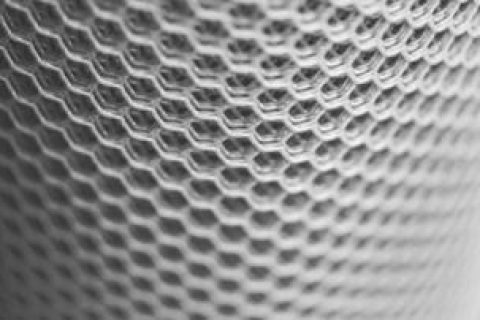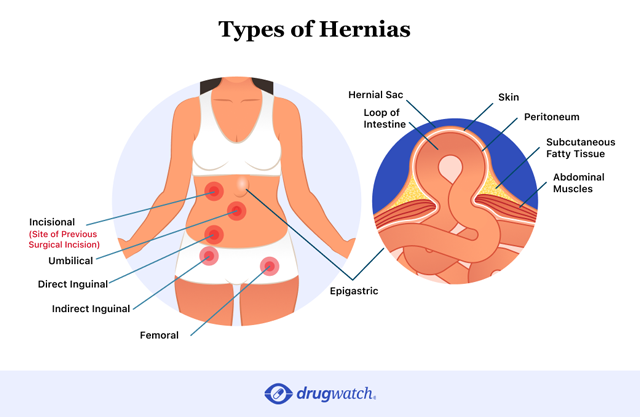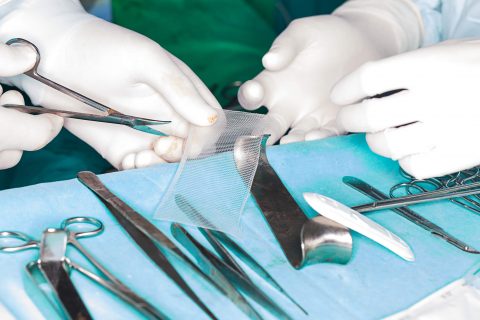
Hernia Mesh Complications
After hernia repair surgery, patients may experience various hernia mesh complications. The most common hernia mesh complications are persistent pain, infection, hernia recurrence, adhesion and bowel obstruction. Some patients have also reported instances of mesh failure and migration.
What Are Common Hernia Mesh Complications?
Common hernia mesh complications include pain, surgical site infection, hernia recurrence, adhesion, bladder injuries, vascular injuries and bowel obstruction, which can be serious. Mesh migration and mesh shrinkage may occur as a result of hernia mesh repair.
Hernia procedures that require mesh as part of the repair are straightforward, but sometimes they require revision surgery to correct problems that cause hernia mesh pain.
Complications fit into one of two categories: Operative and post-operative. Operative issues stem usually from tissues damaged during surgery. Post-operative complications relate to the hernia recurring, post-op pain from an infection or rejection of the mesh.
- Adhesion
- Infection
- Rejection
- Bowel obstruction
- Mesh migration
- Mesh shrinkage
- Bowel perforation
- Bleeding
- Chronic pain
- Hernia recurrence
The U.S. Food and Drug Administration notes that hernia repairs are common, with more than 1 million performed annually in the United States. More than 90% of those procedures use hernia mesh for repairs.
Complications from Infection
Minor infections may occur anywhere along a suture site where the hernia was repaired. Sometimes the infection can spread to other parts of the body. A course of antibiotics can treat minor infections, but deep, chronic infections around the mesh and repaired hernia are more difficult to treat.
Symptoms of chronic infections include inflammation, fever and flu-like symptoms. It may take years for signs of these infections to become noticeable. Doctors may treat deep infections by removing the implanted mesh.

Can Hernia Mesh Cause Problems Years Later?
Most complications from hernia mesh show up in the immediate aftermath of surgery, but some don’t cause problems until years later. Recurrence of hernias, particularly inguinal hernias, are common. About one in six people 65 years of age or older may require a hernia repair within 10 years of an initial surgery.
- Hernia recurrence
- Lost work time
- Medical bills
- Pain and suffering
Recurrence was the most common complication before the hernia mesh’s invention. Research is mixed on how long a mesh hernia repair will last. A 2022 study followed 100 patients for ten years after a ventral abdominal hernia repair.
No recurrence was recorded after three years, while about 10% had a recurrence after roughly eight years. Two patients had a central breakdown of the mesh at about seven years. Mesh had stretched across the defect by an average of 21%. Mechanical testing showed that the mesh lost its elasticity at low forces.
Infection, pain, hernia recurrence, intestinal obstruction and adhesion are the most common side effects reported by the FDA following mesh-based hernia repair.
“After a patient has had surgery to fix their hernia, it can be devastating for that hernia to come back, especially if it means more surgery. ”
A 2022 analysis of 408 people in Sweden who had hernia surgery from 2007-2014 showed 20% developed at least one complication that needed treatment. Many people who have experienced serious complications after hernia surgery are filing hernia mesh lawsuits against the manufacturers of their mesh.
Hernia Mesh Adhesion
Hernia mesh adhesion refers to scar-like tissue that forms around implanted mesh and joins the mesh to internal tissue or organs. Adhesion can develop a few days after surgery. Many hernia mesh manufacturers coat their devices to help avoid adhesion.
Large amounts of scar tissue surrounding implanted mesh may make for difficult repairs and lead to a cycle of more scar tissue development and more corrective surgeries. For this reason, doctors recommend further study of mesh-related hernia procedures and alternatives to surgery.
A 2016 study found that synthetic nondegradable mesh led to higher rates of adhesions, so doctors don’t recommend it for infected areas.
Hernia Mesh and Bowel Complications
Hernia mesh surgery can cause bowel complications, the most serious of which are bowel obstruction and bowel perforations. Mesh can obstruct the bowel if it moves, trapping loops of intestine.
Hernia surgery that uses mesh may also cause inflammation and irritation of the bowels if the mesh adheres to the intestines.
Bowel Obstruction
Bowel obstructions are serious and potentially fatal, and they require immediate treatment. Untreated obstructions can cut off blood flow, resulting in the death of a section of the intestine.
If the mesh creates an intestinal obstruction, surgeons may have to remove part of the intestine. Recalled hernia mesh is a leading cause of intestinal perforation and blockage.
Bowel obstruction symptoms include difficulty passing gas or stool, dehydration, constipation, vomiting, fever and nausea. Contact your surgeon immediately if you experience any of these post-surgery symptoms.
Bowel Perforation
Bowel perforation is a rare complication of hernia surgery. It can happen if sutures fail and the mesh punctures or erodes into the bowels, abdominal walls or other organs.
- Nausea
- Vomiting
- Severe abdominal pain
- Abdominal rigidity
Bowel perforation may also happen when the mesh disintegrates. Perforation can cause peritoneum inflammation (peritonitis), leading to sepsis, a life-threatening infection that is often difficult to treat.
Hernia Mesh Migration
During laparoscopic hernia repair, the surgeon sews the surgical mesh to the abdominal wall. Mesh migration may occur if the mesh detaches and moves out of its original position. Migration can lead to several complications, including fistulas, adhesions, abscesses and bowel obstruction. It can also cause infections.
Symptoms of hernia mesh migration include pain, nausea, fever, chills, vomiting, swelling, redness, skin irritation, fluid buildup and weight loss. It’s also possible that no symptoms present until the migrated mesh creates an emergency.
Hernia Mesh Rejection
Mesh rejection occurs when the body tries to expel the implanted foreign material. People who had their hernia repaired with synthetic mesh experience rejection at rates ranging from 5% to 30%. Inflammation and scarring around the implant site can cause mesh rejection.
Signs of rejection are discomfort after eating, coughing, sneezing, laughing or exercising.
- Extreme swelling at the surgical site
- Tenderness or pain
- Redness
- Flu-like symptoms
Left untreated, mesh rejection can lead to severe complications such as bowel obstruction, fistula formation and chronic pain.
Hernia Recurrence After Hernia Mesh Surgery
Recurrence of a hernia following previous hernia surgery is about 15%. One of the leading causes of hernia recurrence is a flaw in the mesh’s manufacturing design, elevating the risk of recurrent hernias in some people.
Hernia recurrence is not uncommon. Hernias can recur if a patient is too active during their recovery, especially in the first few weeks following surgery.
“Although there are many different types of materials used to secure a mesh, there have been no dramatic clinical differences between them. In a study comparing permanent tacks, absorbable tacks and synthetic glue, all fixation methods showed no differences in postoperative pain and recurrence.”
People who undergo laparoscopic surgery have a lower risk of hernia recurrence than those who have open repair surgery.
How to Tell if Hernia Mesh Ripped
The symptoms of a ripped hernia mesh device may resemble those of hernia mesh failure. The signs of a ruptured hernia depend on how big the rupture is. Smaller tears may not cause any symptoms.
Larger tears may cause severe pain, swelling, nausea, vomiting, fever and loss of appetite. Patients sometimes experience shortness of breath, chest pain and difficulty breathing.
You can prevent these problems by avoiding lifting heavy objects and not sitting abruptly during recovery from hernia mesh surgery.
How to Tell If Hernia Mesh Failed
Ongoing pain or a recurring hernia may be signs that the surgical mesh tore after being implanted. But these symptoms can relate to other complications, too. Sometimes surgery may be the only way to tell for sure if the hernia mesh is damaged.
Mesh may rip from the sutures or tacks holding it in place in the days immediately after surgery. This is rare and is likely to happen only if someone lifts something too heavy or overexerts themselves physically. This can also cause a hernia recurrence.
Following the original procedure, surgeons limit physical activity for patients during the first few weeks of recovery from hernia mesh surgery. This allows scar tissue to form around the mesh, strengthening the repair.
If mesh shrinks, it may also rip loose from sutures or tacks. This can cause mesh migration. Over time, mesh may erode in the body and break into pieces. Edges can cut or perforate tissue.
- High fever (101 F)
- Infection
- Excessive pain, bruising or swelling
- Increased redness or drainage from the incision
- Stiffness in the abdomen
- Nausea, vomiting or other flu-like symptoms
- Difficulty urinating or passing gas and stool
Hernia mesh complications can be hard to diagnose. People who experience these symptoms should inform their doctors that they had hernia mesh surgery.
Diagnosing and Treating Hernia Mesh Complications
Discomfort and tenderness should be expected following a hernia mesh procedure, but prolonged pain, stabbing pain and swelling around the surgery site may indicate a complication. Doctors use X-rays, CT scans and blood tests to detect problems.
If someone has an adhesion or a fistula several months after a procedure, doctors can treat them with or without surgery. Nonsurgical treatments include anti-microbial, anti-inflammatory medications and pain relievers, which work best for minor complications.
Doctors rely on follow-up surgery for serious complications, which may involve removing the mesh. Surgeons won’t know the extent of the surgery until after they’ve made the incision, as the mesh might have intertwined with internal organs.
There are two main types of surgery. Laparoscopic is less invasive and involves several tiny incisions large enough to allow surgical tools through to repair the hernia. Open repair is more invasive. Doctors make an incision near the hernia for access to make the repair.
Calling this number connects you with a Drugwatch representative. We will direct you to one of our trusted legal partners for a free case review.
Drugwatch's trusted legal partners support the organization's mission to keep people safe from dangerous drugs and medical devices. For more information, visit our partners page.







